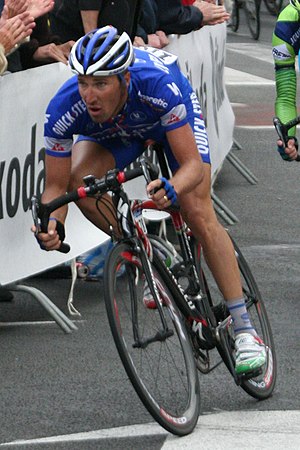
Back علم فيزيولوجيا الرياضة Arabic Sportphysiologie German Εργοφυσιολογία Greek Fisiología del ejercicio Spanish فیزیولوژی ورزشی Persian Physiologie sportive French A testmozgás fiziológiája Hungarian 運動生理学 Japanese 운동생리학 Korean Bewegingsfysiologie Dutch

Exercise physiology is the physiology of physical exercise. It is one of the allied health professions, and involves the study of the acute responses and chronic adaptations to exercise. Exercise physiologists are the highest qualified exercise professionals and utilise education, lifestyle intervention and specific forms of exercise to rehabilitate and manage acute and chronic injuries and conditions.
Understanding the effect of exercise involves studying specific changes in muscular, cardiovascular, and neurohumoral systems that lead to changes in functional capacity and strength due to endurance training or strength training.[2] The effect of training on the body has been defined as the reaction to the adaptive responses of the body arising from exercise[3] or as "an elevation of metabolism produced by exercise".[4]
Exercise physiologists study the effect of exercise on pathology, and the mechanisms by which exercise can reduce or reverse disease progression.
- ^ Capostagno, B; Lambert, M. I; Lamberts, R. P (2016). "A Systematic Review of Submaximal Cycle Tests to Predict, Monitor, and Optimize Cycling Performance". International Journal of Sports Physiology and Performance. 11 (6): 707–714. doi:10.1123/ijspp.2016-0174. PMID 27701968.
- ^ Awtry, Eric H.; Balady, Gary J. (2007). "Exercise and Physical Activity". In Topol, Eric J. (ed.). Textbook of Cardiovascular Medicine (3rd ed.). Lippincott Williams & Wilkins. p. 83. ISBN 978-0-7817-7012-5.
- ^ Bompa, Tudor O.; Haff, G. Gregory (2009) [1983]. "Basis for Training". Periodization: Theory and Methodology of Training (5th ed.). Champaign, Illinois: Human Kinetics. pp. 12–13. ISBN 9780736085472.[permanent dead link]
- ^ Lee, Buddy (2010). Jump Rope Training (2nd ed.). Human Kinetics. p. 207. ISBN 978-0-7360-8978-4.